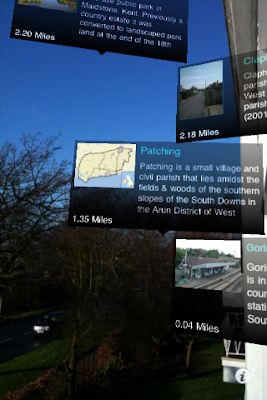
After watching an episode of Click on the BBC news Channel, I was alerted to the Nearest Wiki App.
This App has massive potential for Geography fieldtrips. By having an iPhone or available it would be possible to:
1. It is possible to find out a little more about your surroundings.
For example, by launching the Nearest Wiki App the camera, GPS and compass is used to calculate where you are are in which direction the camera is facing. This allows Wikipedia articles that are close to be displayed. Below is what I could see from my flat's balcony.

By clicking on one of the article summaries, the app displays the full wikipedia entry:


This has huge potential for use during pre-visits and even in setting activities and research
2. Pupils can create geolocated Wikipedia articles
Young people could create an augmented reality of their school, local area or street. They could create and write a Wikipedia article which could then be viewed by visitors
This has huge potential, especially if linked in to the 21st Century Fellowship work and could form part of the virtual time capsule of the space. Visitors to te news school could view articles written about the space before its BSF transformation.
I think I will try this out later in the week by creating an article - the challenge being to identify a local spot that hasn't been written about!
Hi David,
ReplyDeleteLove the idea behind this, but think it might need GPS and camera that the iphone offers. I just tried to download for the ipod touch and app store says no matches found, despite showing up in the text predictor. Tends to say this when device doesn't have capability.Looks like in April 2011, I'll have to get that iphone!:)
Hi Kenny
ReplyDeleteThanks for pointing this out! I don't have an iPod Touch so have assumed that they are similar devices. Posts updated as a result.
David